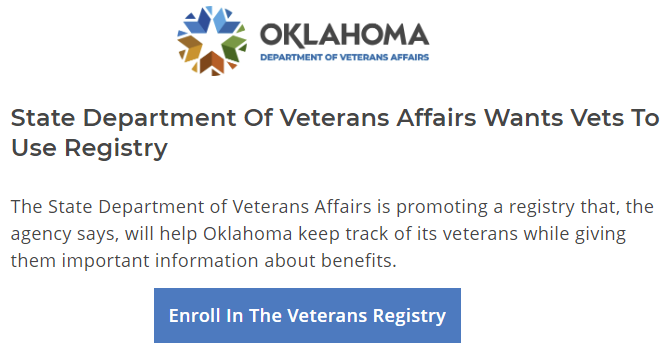In appearances before veterans groups this week, Veterans Affairs Secretary Dr. David Shulkin is outlining his 10-point plan for reforming department operations and offerings, with a heavy emphasis on VA medical improvements. plan is separate from the 10-point VA plan President Trump unveiled on the campaign trail last summer, The list includes:
1. New accountability legislation
2. Extend the Choice deadline past August
3. Choice 2.0 Legislation
4. Infrastructure improvements and consolidations –
5. VA/DOD federal coordination
6. Enhance foundational services in VA
7. Electronic medical record modernization
8. Breakthrough in suicide prevention –
9. Appeals modernization
10. Accelerating performance on benefits claims
• Secretary Shulkin’s 10-point reform plan:
Tulsa Tech Limited Time Tuition Waiver
Tulsa Tech
Information Relating to Military Tuition Waiver
This is a Financial Assistance opportunity included in Tulsa Tech Financial Assistance flyer along with other Scholarships and Grants. The program was approved by the Board of Education in 2016 and is intended to fill a gap in the availability of VA Educational Benefits which are current not able to be approved for many of the Tulsa Tech Full-Time programs due to issue relating to accreditation.
Military Tuition Waiver
Oklahoma veterans are eligible to attend one full time program
tuition free. Applicants must have served active duty
in the U.S. Military and have been honorably discharged
within the last 15 years.
The term “one full time program”, also referred to as “one full time career major”, includes any “Full-Time Programs” contained in the current “Make Your Own Path – Full-Time Classes” catalog which are identified for “Adults”. The selection of the “one full-time program” will cover the entire duration of the program, for example a Powersports Technology program of 5 months (all day) to 27-30 months (Evening) program for Aviation Generals. Note that this is a waiver of Tuition only. Any books or other related costs/expenses are not included in this program.
The Military Tuition Waiver application is available online via the HUB. https://hub.tulsatech.edu/studentresources/financialassistance/Documents/Military Tuition Waiver Application_v2.pdf
Eligibility Criteria are listed on the application as follows:
- Must have served on active duty and must have been honorably discharged.
- Must use this scholarship within 15 years of the date of separation from the U.S. Military.
- Must be an Oklahoma resident.
A copy of a valid OK Driver’s License or OK State issued ID and coy of DD-214 are required to be provided with the application.
Note that the applicant must go through the standard application process and be selected for the application program. Not every program will have availability for each applicant.
For details and face-to-face assistance for this program, the Tulsa Tech contact is:
Samantha Alberty
Financial Assistance Consultant
918 828-5223
Samantha.alberty@tulsatech.edu
Located on the Tulsa Tech Lemley Memorial Campus at 3420 S Memorial Drive
Office in the Career Service Center (CSC) building, Financial Aid Office
Follow Signs for “ENROLLMENT”
Suicide risk and risk of death among recent veterans:
Among deployed and non-deployed active duty Veterans who served during the Iraq or Afghanistan wars between 2001 and 2007, the rate of suicide was greatest the first three years after leaving service, according to a recent study.
Compared to the U.S. population, both deployed and non-deployed Veterans had a higher risk of suicide, but a lower risk of death from other causes combined. Deployed Veterans also had a lower risk of suicide compared to non-deployed Veterans.
These findings are from a study that looked at the vital status of 1.3 million Veterans from their time of discharge through the end of 2009
Volunteers constructed an entire community to house homeless veterans:
Many veterans sacrifice comfortable, lucrative lives to protect the liberties of their home country—only to find nothing left of those former lives when they return. In the face of rising veteran homelessness rates, due in part to inadequate medical and psychological resources, Missouri volunteers pooled their creativity, time, and money to create a community of tiny homes that welcomes veterans, completely free of charge.,
There is an organization in Oklahoma that has started creating homeless villages for homeless veterans and building tiny homes for homeless veterans
Former soldier creates app for Oklahoma veterans:
A new Android app being made available at no cost for Muskogee, Okla.-area veterans will plug them into practically every resource they could need or want. The Barracks is the brainchild of Army veteran Victor Lezama. The app includes direct access to a crisis hotline, assistance with medical claims, job-assistance programs, housing information, recreation and veteran discounts.
“Our main concern is for veterans in crisis — let’s get them help as soon as possible, even if to talk,” Lezama said, noting the first thing a veteran will see when the app opens is a telephone number to a crisis hotline. “My favorite thing is that veterans can click on Crisis Hotline and have the option to text, call or chat with somebody for help.”
The Barracks is available for download now on Google Play. An iPhone version of the app is expected to be available in two weeks.
Legislation of the 115th Senate:
Introduced –
S.410 – A bill to amend title 38, United States Code, to authorize the transfer of unused Post-9/11 Educational Assistance benefits to additional dependents upon the death of the originally designated dependent..
S.423 – A bill to amend title 38, United States Code, to increase the maximum age for children eligible for medical care under the CHAMPVA program, and for other purposes.
S.422 – A bill to amend title 38, United States Code, to clarify presumptions relating to the exposure of certain veterans who served in the vicinity of the Republic of Vietnam, and for other purposes.
S.324 – State Veterans Home Adult Day Health Care Improvement Act of 2017
S.112 – Creating a Reliable Environment for Veterans’ Dependents Act –
A bill to amend title 38, United States Code, to authorize per diem payments under comprehensive service programs for homeless veterans to furnish care to dependents of homeless veterans, and for other purposes.
S.24 – A bill to expand eligibility for hospital care and medical services under section 101 of the Veterans Access, Choice, and Accountability Act of 2014 to include veterans who are age 75 or older, and for other purposes. –
This bill amends the Veterans Access, Choice, and Accountability Act of 2014 to extend hospital and medical services under the Veterans Choice Program to veterans who are age 75 years or older
Legislation of the 115th House of Representatives:
Introduced –
H.R. 369, Eliminating the Sunset Date of the Choice Act –
Eliminating the Sunset Date of the Choice Act, would eliminate the statutory sunset date for the Choice Program and instead allow the program to continue until the original funding has been expended. The Choice Act included language to state that the Department of Veterans Affairs (VA) is authorized to continue services until August 7, 2017, or until the funds provided under the Choice Act ran out, whichever occurred first. While the authorization is set to expire on August 7, 2017, the VA has informed Congress there will still be funds remaining in the Veterans Choice Program after August 7, meaning veterans could still access health care services under the Choice Act if Congress eliminates the sunset date. Should Congress eliminate the sunset date of the Veterans Choice Program, veterans utilizing the program can continue seeking care outside the VA under this authority, paid for with funds that have already been appropriated, while Congress continues to pursue VA reform.
H.R. 1181: Veterans 2nd Amendment Protection Act –
The Veterans 2nd Amendment Protection Act would prohibit VA from considering any beneficiary who is assisted by a fiduciary as “mentally defective” without a magistrate or judicial authority ruling that the beneficiary is a danger to themselves or others.
Passed House –
H.R. 512: WINGMAN Act –
The WINGMAN Act allows designated permanent, full time Congressional staffers to look up the status of a veteran’s claim on VA’s database—but only if the veteran has given the staffer permission
H.R. 974: Boosting Rates of American Veteran Employment (BRAVE) Act –
The BRAVE Act is designed to boost veteran employment by allowing VA to give preference when awarding procurement contracts to government contractors who employ veterans on a fulltime basis
H.R. 28: The Biological Implant Tracking and Veterans Safety Act –
The Biological Implant Tracking and Veterans Safety Act directs the Secretary of Veterans Affairs to adopt the FDA’s unique device identification system (UDI) for labeling of all biological implants and to implement an automated inventory system to ensure veterans do not receive expired or otherwise contaminated tissue
Please Support the Military Surviving Spouses Equity Act
|
|||
|
Military family tax burden ► H.R.282 | Spouse State Residency
Military spouses would be able to simplify their state residency status — and their tax bills — under new legislation introduced by a pair of Republican lawmakers this week. The Military Residency Choice Act H.R.282 is designed to untangle the sometimes complicated residency rules surrounding military families, whose frequent duty assignment changes and cross-country moves can leave a confusing trail of paperwork. Bill sponsors Rob Wittman, (R-VA) and Darrell Issa (R-CA) said simplifying those rules could lead to fewer financial problems for those
families and even help military spouses continue their careers as they jump from state to state. “The last thing our military families need is additional stress during tax season,” Wittman said in a statement. “Allowing military families to establish a consistent state of residency will give spouses the confidence to rejoin the workforce when they move and help them better provide for their families.”
The new measure allows military spouses to adopt their servicemembers’ state of residency as their own, even if they never lived there before. For all future moves, the couple will have the same state for tax and voting purposes.





